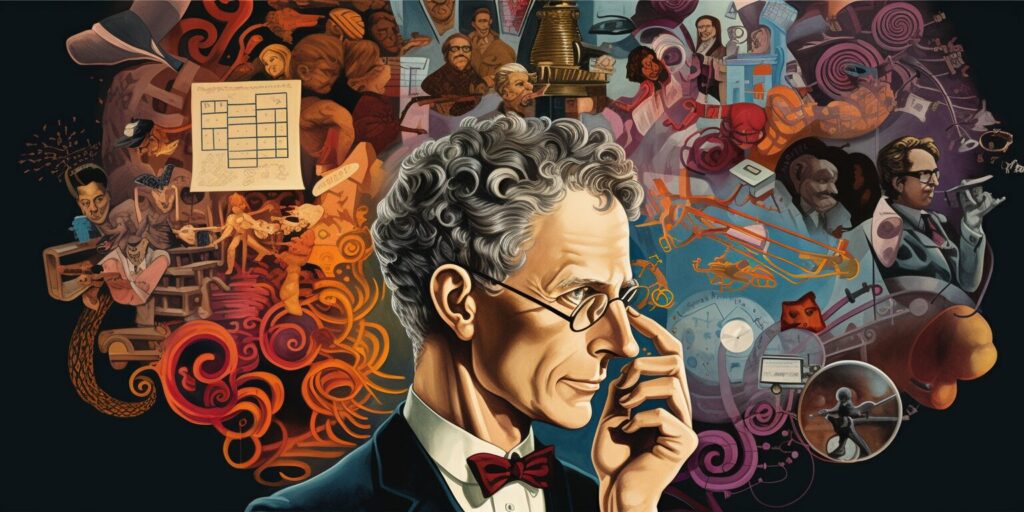Famous behaviorist psychologists have made significant contributions to the field of psychology, shaping our understanding of human behavior and learning. These individuals have delved into the complexities of the mind, studying how external stimuli influence our actions and emotions. By applying scientific methods and rigorous observation, behaviorist psychologists have provided valuable insights into human behavior that continue to inform research and practical applications today.
One renowned figure in behaviorist psychology is B.F. Skinner. Known for his theories on operant conditioning, Skinner emphasized the role of rewards and punishments in shaping behavior. He believed that behaviors are learned through a process of reinforcement, where positive consequences increase the likelihood of a behavior being repeated while negative consequences decrease it. Skinner’s work has had a profound impact not only on psychology but also on fields such as education and animal training.
Another influential psychologist in this field is Ivan Pavlov, famous for his experiments with conditioning dogs’ salivary responses. Through his studies on classical conditioning, Pavlov demonstrated how associations between stimuli can lead to learned responses. His work laid the foundation for understanding how we acquire conditioned reflexes and opened new avenues for investigating behavioral patterns in both humans and animals.
These are just two examples among many notable behaviorist psychologists who have left a lasting legacy in their pursuit to understand human behavior. Their groundbreaking research continues to shape our understanding of psychological processes and serves as a basis for developing effective interventions and treatments in various fields ranging from therapy to education.
Ivan Pavlov: The Pioneer of Behaviorism
Let’s delve into the life and work of Ivan Pavlov, a renowned psychologist who revolutionized our understanding of behaviorism. Born on September 14, 1849, in Russia, Pavlov dedicated his career to studying the science behind learning and conditioning.
Pavlov’s groundbreaking research centered around his famous experiments with dogs. He observed that dogs could be conditioned to associate certain stimuli with specific responses. By ringing a bell before presenting food to the dogs repeatedly, he discovered that they would eventually salivate at the sound of the bell alone, even without any food present.
This phenomenon became known as classical conditioning and laid the foundation for behaviorism as a scientific discipline. Pavlov’s findings challenged traditional views on psychology and sparked new avenues for exploration in understanding human behavior.
Beyond his contributions to classical conditioning, Pavlov also made significant advancements in neurophysiology. He studied the digestive system extensively and received a Nobel Prize in Physiology or Medicine in 1904 for his discoveries related to gastric reflexes.
Pavlov’s research had far-reaching implications beyond just animal behavior. His work influenced fields such as education, marketing, and therapy, demonstrating how external stimuli can shape our behaviors and responses. Today, his theories continue to inspire researchers across various disciplines.
In summary, Ivan Pavlov was a true pioneer in the field of behaviorism. Through his innovative experiments with dogs and extensive studies on conditioning, he forever changed our understanding of how individuals learn and respond to their environment. His legacy lives on through ongoing research that builds upon his foundational work in psychology.
B.F. Skinner: The Father of Operant Conditioning
When it comes to famous behaviorist psychologists, one name that stands out is B.F. Skinner. He’s widely regarded as the father of operant conditioning, a groundbreaking theory in psychology that has had a profound impact on our understanding of human behavior.
Skinner’s work revolutionized the field by shifting the focus from studying internal mental processes to observable behaviors and their consequences. He believed that behavior is influenced by its consequences, specifically through reinforcement or punishment.
One key concept in Skinner’s theory is positive reinforcement, which involves providing rewards or incentives to increase the likelihood of a desired behavior occurring again. For example, imagine a child who receives praise and a treat for completing their homework diligently. This positive reinforcement encourages them to continue their good study habits.
On the other hand, Skinner also explored negative reinforcement, where an unpleasant stimulus is removed or avoided to strengthen a particular behavior. An example could be an employee who works hard to meet deadlines in order to avoid criticism from their boss.
To further illustrate his ideas, Skinner conducted numerous experiments using animals such as rats and pigeons. These experiments demonstrated how animals can be trained and conditioned through operant conditioning principles.
Skinner’s theories have found practical applications in various fields, such as education and parenting techniques. Teachers often use positive reinforcements like stickers or extra playtime to motivate students, while parents may utilize time-outs or loss of privileges as forms of punishment for undesirable behaviors.
In summary, B.F. Skinner’s contributions as the father of operant conditioning have greatly shaped our understanding of how behaviors are learned and modified through consequences. His research on positive and negative reinforcements continues to influence psychology today, making him one of the most influential psychologists in history.
A. Bandura: The Developer of Social Learning Theory
Albert Bandura is an influential figure in the field of psychology, particularly known for his groundbreaking work on social learning theory and observational learning. His research has significantly shaped our understanding of how individuals acquire and modify behaviors through observation and modeling.
Bandura’s social learning theory posits that people learn not only through direct experience but also by observing others. This theory emphasizes the role of imitation and the impact of social interactions on behavior. According to Bandura, individuals can acquire new behaviors by watching others perform them successfully, which he referred to as observational learning.
One famous experiment conducted by Bandura that exemplifies his theory is the Bobo doll experiment. In this study, children observed an adult model behaving aggressively towards a Bobo doll, such as hitting or kicking it. Later, when given the opportunity to interact with the doll themselves, the children imitated the aggressive behaviors they had witnessed. This demonstrated that observational learning plays a crucial role in shaping behavior.
Bandura’s research has significant implications not only in psychology but also in fields such as education and criminology. By recognizing that individuals learn from observing others, educators can use positive role models and provide opportunities for observational learning to enhance students’ skills and knowledge acquisition.
In addition to his contributions to social learning theory, Bandura has explored other areas within psychology. For example, he developed the concept of self-efficacy, which refers to an individual’s belief in their ability to succeed in specific situations or tasks. According to Bandura, self-efficacy plays a vital role in motivation and achievement.
Overall, Albert Bandura’s work has had a profound impact on our understanding of human behavior and learning processes. His theories continue to shape research across various disciplines and have practical applications in areas ranging from education to therapy. By emphasizing the importance of observation and modeling in shaping behavior, Bandura’s work provides valuable insights into how we acquire new skills and navigate our social environments.
John B. Watson: Founder of Behaviorism
John B. Watson, widely regarded as the founder of behaviorism, made significant contributions to the field of psychology with his groundbreaking theories and research. Let’s delve into the life and work of this influential figure.
- Early Life and Education: Born in 1878 in South Carolina, Watson displayed an early interest in animal behavior. He pursued his education at Furman University and later earned his Ph.D. from the University of Chicago under the guidance of renowned psychologist James Angell.
- The Birth of Behaviorism: It was during his time at Johns Hopkins University that Watson laid the foundation for behaviorism by publishing his seminal paper titled “Psychology as a Behaviorist Views It” in 1913. In this paper, he outlined his belief that psychology should focus solely on observable behaviors rather than subjective mental processes.
- Little Albert Experiment: One of Watson’s most controversial yet influential studies was the famous “Little Albert” experiment conducted in 1920. This study aimed to demonstrate how fear could be conditioned in a previously unafraid child through classical conditioning techniques involving a white rat and loud noise stimuli.
- Behaviorism’s Impact: Watson’s ideas had a profound impact on psychology, shifting the focus from introspection and mental processes to objective observation and measurable behaviors. His emphasis on environmental factors shaping human behavior paved the way for future developments within behaviorism.
- Later Years and Legacy: Despite facing criticism for his reductionist views, Watson continued to contribute to psychology throughout his career. He became an influential figure in advertising and marketing, applying behavioral principles to consumer behavior analysis.
The work of John B. Watson laid the groundwork for modern-day behavioral approaches in psychology, influencing countless researchers and practitioners alike. By emphasizing observable behaviors over internal thoughts or emotions, he revolutionized our understanding of human nature and left an indelible mark on the field of psychology.
Edward Thorndike: The Law of Effect
Let’s delve into the fascinating work of Edward Thorndike and explore his groundbreaking theory known as the Law of Effect. This principle revolutionized the field of psychology, shedding light on how behavior is influenced by its consequences.
One of Thorndike’s key contributions was his emphasis on the relationship between actions and their outcomes. According to him, behaviors that lead to satisfying or pleasurable outcomes are more likely to be repeated, while those resulting in discomfort or negative consequences are less likely to recur. This concept became widely known as the Law of Effect.
To illustrate this theory, let’s consider a simple example. Imagine a rat placed inside a puzzle box with a lever that, when pressed, releases a food reward. At first, the rat may randomly explore its surroundings but eventually stumbles upon the lever by chance. When it accidentally presses it and receives food, it experiences pleasure and satisfaction.
Through repeated trials and errors, the rat quickly learns that pressing the lever leads to a positive outcome. As a result, it becomes increasingly inclined to repeat this behavior whenever placed in similar situations. This process demonstrates how rewarding consequences reinforce specific actions under Thorndike’s Law of Effect.
Thorndike’s research extended beyond animals and found application in human learning as well. His principles laid the foundation for operant conditioning theories developed by B.F. Skinner later on.
In summary, Edward Thorndike’s Law of Effect highlights how behavior is shaped through reinforcement or punishment based on its consequences. By understanding this fundamental principle, psychologists have gained valuable insights into human and animal learning processes alike.
Now that we’ve explored Edward Thorndike’s notable contribution to psychology with his Law of Effect, let us move forward with our discussion on other influential behaviorist psychologists in subsequent sections.
Jean Piaget: Cognitive Development and Behaviorism
When it comes to famous behaviorist psychologists, one name that stands out is Jean Piaget. His groundbreaking work in the field of cognitive development has had a profound impact on our understanding of how individuals acquire knowledge and develop their thinking processes.
Piaget’s theory of cognitive development emphasized the role of active learning and exploration in shaping a child’s understanding of the world. He believed that children go through distinct stages as they grow, each characterized by different ways of thinking and reasoning. This perspective challenged the prevailing notion at the time that children were simply passive recipients of information.
One key aspect of Piaget’s theory was his focus on schemas, which are mental frameworks or structures we use to organize and interpret information. According to Piaget, children construct these schemas through interactions with their environment, constantly adapting and modifying them as they encounter new experiences.
For example, let’s consider a child who sees a dog for the first time. Initially, they might have a simple schema for “four-legged animals.” However, when they encounter a cat or horse later on, they realize that not all four-legged animals are dogs. This process of assimilation (fitting new information into existing schemas) and accommodation (modifying existing schemas to fit new information) is crucial for cognitive growth.
Piaget also highlighted the importance of play in cognitive development. He observed that through play, children engage in symbolic representation and pretend play activities that help them practice problem-solving skills and develop abstract thinking abilities.
In summary, Jean Piaget made significant contributions to our understanding of cognitive development by emphasizing the active role children play in constructing their own knowledge. His emphasis on schemas, stages of development, and the role of play has shaped modern educational practices worldwide. By studying his work, we gain valuable insights into how individuals learn and grow throughout their lives.
E. Erikson: Psychological Development and Behavioral Patterns
Erik Erikson is a renowned figure in the field of psychology, known for his groundbreaking work on psychosocial development and behavioral patterns. His theories have had a significant impact on our understanding of human behavior and how individuals navigate through various stages of life. In this section, we’ll delve into Erikson’s key concepts and shed light on their implications.
- Trust vs. Mistrust: During infancy, infants learn to trust or mistrust their caregivers based on the consistency and reliability of their care. If they receive consistent love, attention, and nurturing, they develop a sense of trust in the world around them. On the other hand, inconsistent or neglectful care can lead to feelings of mistrust and insecurity later in life.
- Autonomy vs. Shame and Doubt: As children grow older (around toddlerhood), they begin to assert their independence and explore their environment. Erikson believed that allowing children to make choices within reasonable boundaries fosters autonomy. However, excessive control or criticism from caregivers can result in shame and doubt about one’s abilities.
- Initiative vs. Guilt: During early childhood (preschool years), children develop a sense of initiative as they engage in imaginative play and take on new challenges independently. Encouragement from parents and teachers helps foster a positive sense of purposefulness. Conversely, if children are constantly criticized or made to feel guilty for expressing themselves, it can hinder their confidence in taking initiative.
- Industry vs Inferiority: As children progress through primary school years, they face the task of mastering new skills academically, socially, and physically. Success leads to feelings of industry—a sense of competence and accomplishment—while experiencing repeated failure can result in feelings of inferiority.
- Identity vs. Role Confusion: This stage occurs during adolescence when young individuals explore different roles while seeking an identity that aligns with their values, interests, beliefs, etc. They may experiment with different identities and roles, which can lead to a period of confusion. Successfully navigating this stage allows them to form a clear sense of self.
Erik Erikson’s theories have provided valuable insights into the complex nature of human development and behavior. By understanding these psychosocial stages and the challenges individuals face within them, we can gain a deeper appreciation for the intricate interplay between biology, environment, and personal growth.
Summary
To wrap up our exploration of famous behaviorist psychologists, let’s take a moment to reflect on the impact these individuals have had in shaping our understanding of human behavior. From their groundbreaking theories to their innovative research methods, these psychologists have left an indelible mark on the field. Here are a few examples:
- Ivan Pavlov: Known for his pioneering work on classical conditioning, Pavlov’s experiments with dogs laid the foundation for our understanding of learning and behavior. His discovery that animals can be conditioned to associate one stimulus with another has had far-reaching implications in fields such as education, therapy, and marketing.
- B.F. Skinner: A prominent figure in the field of operant conditioning, Skinner introduced the concept of reinforcement and punishment as key factors in shaping behavior. His experiments with rats and pigeons demonstrated how behaviors can be strengthened or weakened based on the consequences they produce. Skinner’s work continues to influence behavioral therapies and techniques used in classrooms today.
- Albert Bandura: Best known for his social learning theory, Bandura emphasized the role of observation and imitation in learning new behaviors. Through his famous Bobo doll experiment, he showed that children learn aggressive behaviors by observing others’ actions. This insight revolutionized our understanding of how people acquire new skills and behaviors through modeling.
- John B. Watson: Considered one of the founders of behaviorism, Watson believed that all human behavior is learned through experience rather than being innate or driven by unconscious processes. He famously conducted the “Little Albert” experiment, where he conditioned a young boy to fear white rats by associating them with a loud noise. Watson’s emphasis on objective observation and measurable outcomes shaped modern psychology.
In conclusion, these famous behaviorist psychologists have made significant contributions to our understanding of human behavior. Their theories and experiments have paved the way for advancements in psychology, education, therapy, and other fields. By studying their work, we gain insights into how our behaviors are shaped by environmental factors and learn strategies to modify or change them. The legacy of these psychologists continues to shape our understanding of ourselves and others.



